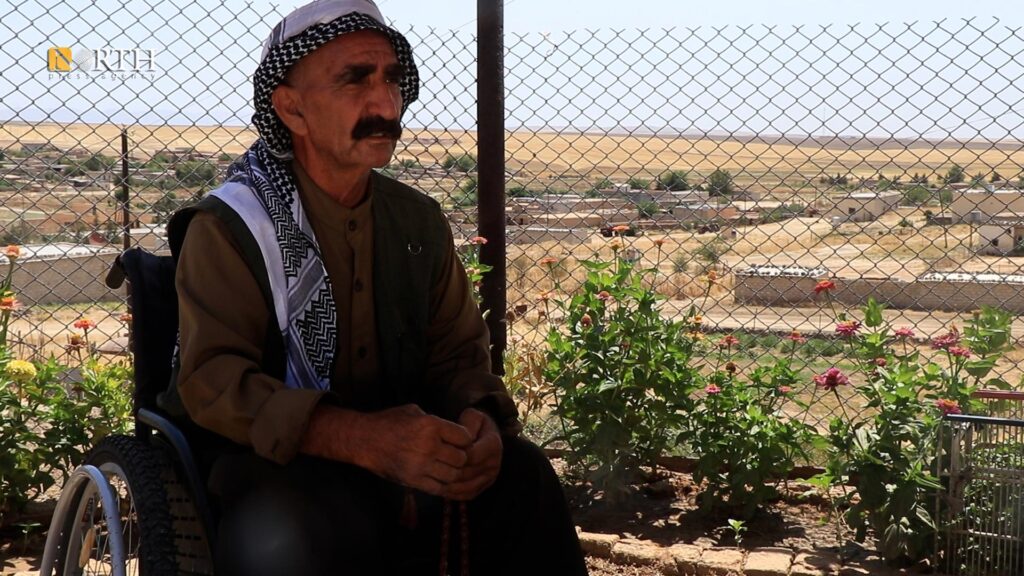Survivor of Turkish attack in NE Syria live in ongoing distress
DERIK, Syria (North Press) – Nazir Khader did not anticipate that his weekend, which he spent away from his family while herding his sheep in the countryside of Derik in far northeast Syria, would turn into a tragedy. He was hit by Turkish bombardment on the Taqel Baqel power station in November 2022.
The man still remembers the day of the incident, which he miraculously survived, as he lost part of his body and many friends and neighbors.
Months have passed since the incident. Khader, 61, narrates the events of that night to North Press as he tries to cope with his current situation. He is unable to work and walk without a crutch.
The day of the incident
Since a young age, Khader has been accustomed to spending weeks away from his house with his livestock to secure fodder for them, like the rest of the residents in his area who rely primarily on agriculture and livestock for their livelihood.
On the night of November 20, 2022, Khader was at home when successive loud noises woke him from his sleep. “I heard loud noises, but I did not recognize them as warplanes.”
It never occurred to him that a Turkish warplane had bombed the Taqel Baqel power station, which is located about 3 km away from his home in the village of Kalhi, 40 km from the city of Derik (Malikiyah) on the Syrian-Iraqi border.
“A villager told me in a phone call that a warplane had targeted a power station and civilians,” Khader told North Press.

Khader recalls these moments, saying, “When we arrived there, we saw that the residents were gathering there. At that time, a worker in the power company lost his life, and others were injured.”
On November 23, 2022, Turkish forces launched airstrikes against oil facilities, as well as the Suwaydiyah and Taqel Baqel power stations near Derik, causing major damage and power outages in 65 villages, according to Akram Suleiman, the co-chair of the Energy Office of the Autonomous Administration of North and East Syria (AANES) in the city of Qamishli.
US forces
Civilians who had come from nearby villages made a statement in the presence of one journalist, who was working for a local media agency, to condemn the attack.
“Civilians gathered there and made a televised statement, stating that it is a civilian institution, not a military headquarters. There are no military personnel there, so how could warplanes target civilians?” he said.
While the crowed were about to leave, one of them said that American vehicles were coming so residents gathered again. When they arrived, one soldier got out of the vehicles, and Khader believed that he was a translator.
As the residents were talking with the soldier, Turkish planes bombed again near the place where the civilians were gathered.
“The bombing was like a warning to the US forces to move away from the targeted place,” Khader noted.
The man recalled the details of that night, saying, “The US vehicles withdrew and the civilians left. I headed to my car and while I was about to drive, some civilians stopped me and rushed to get in.”
Recited the Shahada
After driving for only about 100 meters, a Turkish warplane targeted his car twice in a row, turning it into a pool of blood within moments.
“I only heard a loud noise after something hit my car. At first, I didn’t feel any pain, but I felt dizzy and the car started to tilt to the right and left before I lost consciousness.”
To avoid burns, the old man crawled several meters away from the car, without realizing that all those with him had lost their lives.
“I was trapped in the car; I tried to get out through the windshield which was completely destroyed,” he said.
The man said that he was totally in shock when he realized that he lost one of his legs. “I touched my body to see how bad it hurts, and realized that my leg was gone.”
A few minutes later, “I heard the plane hovering; it bombed again and this is when I put my hands under my head and recited the Shahada [the two testimonies of faith], and then I fainted,” Khader said.
Eleven civilians were killed and six others were injured, including Khader in the Turkish attack.
Turkey stated at the time that it targeted members of the Kurdistan Workers’ Party (PKK), but Khader stressed that these allegations were false, saying, “All those who lost their lives are civilians. Turkey sought to strike the infrastructure to incite the population against the AANES.”
In the ‘Martyr Khabat Cemetery’ in the countryside of Derik, Khader walks slowly among the graves of those who lost their lives that night. “Hussein Youssef lies in this grave, he is from the village of Boroj in Qarachogh. He was a head of a family and now his children are orphans.”
He then points to another grave, saying, “Here lies martyr Issam. Wasn’t he a journalist? He came here to convey the truth to the world. How can they target journalists with warplanes and shells?”
Remembering the victims of that Turkish strike, Khader said, “What is their fault? Hussein used to work in construction and came to help civilians, but our enemy who has no conscience deliberately bombed him. He is now a martyr along with 10 others.”
“No words can express what Turkey is committing against us,” Khader concluded.

